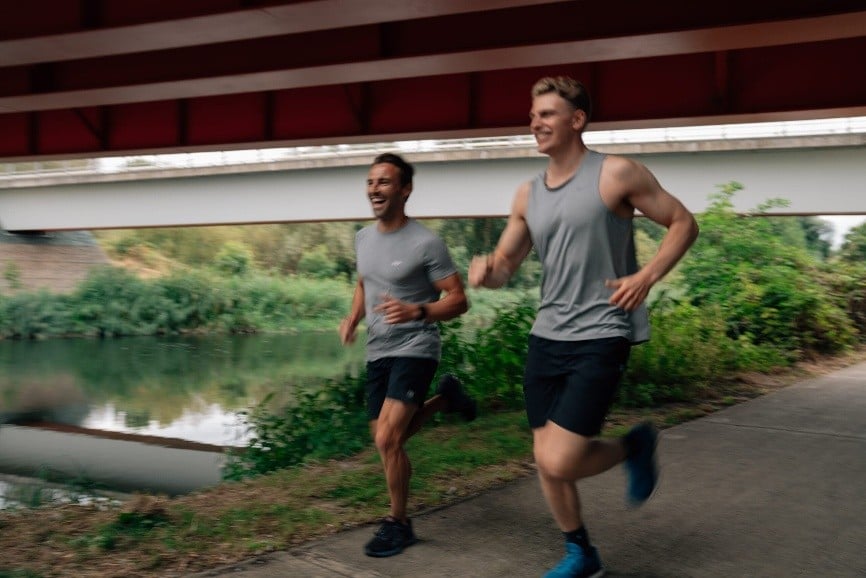7 Ways to Stay Healthy This Winter

Claire Small
Chief Clinical Officer & Consultant Physiotherapist
- 9 December, 2020
- Diet & Nutrition
- 5 min read
7 Ways to Stay Healthy This Winter

We know this time of year is all about the mulled wine, advent chocolate and (hopefully) a chance to put your feet up – none of which you should feel guilty about, by the way. Even clinicians are known to overindulge from time to time. We thought we’d offer our top tips to help balance things out so you’re able to give yourself a well-deserved break this Christmas.
1. Make time for a bit of movement
Ok, we may bang on this drum a lot, but staying physically active plays a huge role in supporting and maintaining a healthy immune system – perfect for the colder months! Research shows that moderate intensity exercise has a positive effect on our immune systems by increasing the volume and circulation of our virus fighting cells.
When performed regularly, this immune response is accumulated, and over time we build more resilient defence systems. The National Institute of Clinical Excellence recommends:
- To do 150 mins of moderate intensity exercise per week, or 75 mins vigorous intensity exercise
- Resistance training 2x per week
- Reduce our time spent sitting
- Be physically active daily
Similarly, bouts of intensive and vigorous exercise without adequate rest days can also lead to overtraining and immunosuppression, thereby being counter-productive to building strong immune systems. So in short, don’t overdo it – sounds pretty good at Christmas time, doesn’t it?
2. Get plenty of shut eye
The importance of a good night’s sleep can’t be understated, and the festive season offers the perfect opportunity for many of us to catch up with it. Research shows sleep plays an important ‘cleansing’ related role within our brain, removing some of the toxins that build up whilst we’re awake.
A lack of sleep has also been associated with inhibited cytokine function. Cytokines are signalling molecules produced by the immune system which help to co-ordinate our virus fighting cells towards sights of infection or inflammation. With this in mind, don’t feel guilty for a few extra lie ins than usual over the holidays.
3 Tips for a better night’s sleep:
- Read a book instead of scrolling on your phone to help you drift off
- Try to create a routine so your body knows when to expect rest
- Listen to a calming podcast or meditation app, like Calm.
3. The sunshine vitamin
The ‘sunshine’ vitamin gets a lot of attention these days, and rightly so. When it enters our body through sunlight or dietary sources, it is first stored in its inactive form within fat cells. The liver and kidneys then convert it into its active form before it is used by the body.
Its main role is to regulate the levels of calcium and phosphate, contributing to a healthy musculoskeletal and immune system.
It’s important to get enough all year round – even more so this year, to further support our immune system during the pandemic. A recent study found that 82.2% of 216 patients treated for Covid-19 at a Spanish hospital were deficient in Vitamin D, compared to 47% in a control group who didn’t have Covid-19, suggesting it may play a role in reducing the risk of acquiring the virus. Some signs to look out for include:
- Tiredness
- Low mood
- Regularly feeling unwell
- Weakness and muscle/bone pain.
The NHS recommends we take 10 micrograms (400 IU) of Vitamin D, daily between October and early March.
4. Manage your stress
It’s safe to say the last couple of years have given us plenty of reasons feel stressed or anxious, with many of us feeling the pressures of the pandemic on our health, jobs, relationships and more.
Stress is a ‘state of threatened homeostasis caused by intrinsic or extrinsic drivers’. We react to it by interactions involving an area of the brain called the hypothalamic-pituitary-adrenal (HPA) axis and the autonomic nervous system, which prompts a series of behavioural and physiological responses.
The reality is our automatic response often isn’t enough and we should also be taking more active steps to improve how we respond to periods of stress. Neuroscientists have found that clarity, calmness and improved focus are just a few of the positive short-term effects of meditation. Long term effects can include, improved concentration, memory and communication skills.
Self-care techniques and learning to be present in the moment, have been known to help improve mental health. Meditation can come in many forms – it doesn’t have to be sitting crossed legged on the floor with your hands on your knees – it can be anything that helps you to find a moment of calm and stillness.
A few examples of useful techniques we have found are:
- Mediation apps – Calm, Headspace and The Mindfullness App.
- Podcasts – Mental Health Foundation Podcast, Untangle and Affirm.
- Write things down – keeping a journal or simply scribbling a jumbled thought on to a scrap of paper just to get it out. Some even like to throw the paper away as if to physically be rid of the negative thought or worry.
- Take up calming creative hobby – painting, colouring (adult colouring books have become quite popular) or even origami.
- Keeping a diary – don’t try to remember it all. Being able to clearly see your plans for the upcoming days or weeks can help to avoid feeling overwhelmed. Be sure to schedule in rest as well – energy is finite, so we need to ensure we take time to recharge.
5. Get outside
Although the weather is colder and it’s getting darker earlier, it can be so beneficial to get outside whether that be for a walk, a jog or a run, it’s a good way to charge up your immune system and blow off the cobwebs.
Exposure to daylight, even in small amounts can have lots of positive effects on your mind and your body. Physiologically, Serotonin (the feel-good hormone) levels are generally lower in winter so being outside can increase these levels which in turn can create a positive mood, increase energy levels and cognitive functions. It’s a win-win for both your mental and physical health, so wrap up warm and get outside!
6. Eat well
Don’t panic, we’re not saying you can’t eat chocolate this Christmas, all we’re saying is find some balance.
Sticking to a well-balanced diet over the winter months will help maintain your immune system as well as provide you with all the vitamins and nutrients you need to be healthy and fight off any infection.
Make sure you’re eating a variety of fruit and veg throughout the day. If you have a blender or juicer, making smoothies and juices are a great way to get everything you need in at once and adding things like turmeric or ginger gives a boost of natural anti-inflammatories.
A good tip is to keep it colourful!
7. Stay hydrated
As the festive season is fast approaching, it is easy to overindulge with food and alcohol so try to avoid excessive consumption and make sure you’re drinking plenty of water to avoid dehydration.
Not only does it keep your body hydrated and working efficiently but drinking enough water throughout the day will help give your immune system a boost as well as keeping your skin from drying out from the cold weather and central heating.
A couple of extra clever things that water can do for you is to help regulate your body temperature and your weight. So try and aim to drink between 2 and 3 litres of water a day to not only stay hydrated, but to help you look and feel great!
Whatever your plans, or whoever you’re able to spend this time with, we hope you have a wonderful time over the festive holiday. These small efforts will go a long way in ensuring that you keep well this winter so you can enjoy it to the fullest!

Advice
Over the last 20+ years our experts have helped more than 100,000 patients, but we don’t stop there. We also like to share our knowledge and insight to help people lead healthier lives, and here you will find our extensive library of advice on a variety of topics to help you do the same.
OUR ADVICE HUBS See all Advice Hubs

